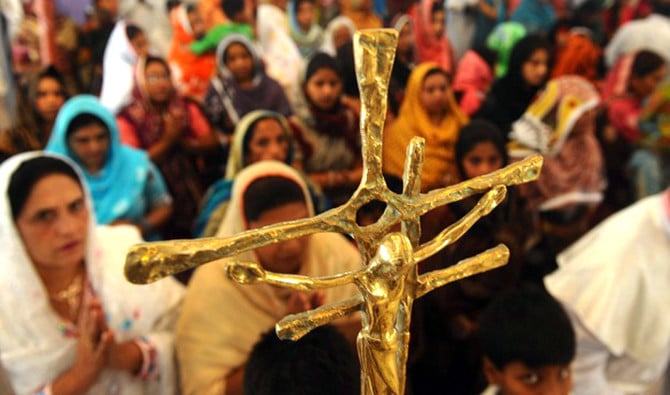Islam in all those rights, which are not related to any religious duty and worship, rather they are related to the discipline of the state and the fundamental rights of the citizens. Gives.
The Holy Qur’an enjoins benevolence, kindness, kindness and tolerance towards non-Muslims who do not fight against Islam and Muslims and do not engage in any repressive activities against them.
Meaning: “Allah does not forbid you from those who did not fight with you on religion and did not drive you out of your homes to treat them with goodness and justice.” (Al-Mumatahna)
In an Islamic state, all non-Muslim minorities and subjects will be guaranteed protection of faith, religion, life and property, and honor and dignity. They will share civil liberties and fundamental rights on a human basis with Muslims.
Everyone will be treated equally in the eyes of the law, no discrimination will be allowed as a human being. After accepting Jizya, they will have the same obligations and responsibilities that Muslims have, they will have the same rights that Muslims have and they will be entitled to all the privileges and facilities that Muslims have.
Protection John:
Both a Muslim and a non-Muslim are equal in the protection of life, the life of both will be equally protected and respected. It is the responsibility of the Islamic state to protect the lives of its non-Muslim subjects and protect them from oppression and abuse. The meaning of the statement of the Holy Prophet ﷺ: “Whoever kills a covenant will not even smell the fragrance of Paradise, while its fragrance can be felt even from a distance of forty years.” (Bukhari)
Protection Material:
The Islamic state will protect the property of the dhimmis like the Muslims, neither will they dispossess them of their right to ownership, nor will they take possession of their lands and properties by force, even if they do not pay jizya, they will be compensated for it. Will not auction the property etc. Hazrat Ali wrote to one of his servants: “Never sell their donkey, their cow and their clothes as tribute.”
Dhimmis will have the rights of buying and selling, industry and crafts and all other means of livelihood like Muslims. Also, they will have the right to dispose of their property, they can also transfer their property to others through wills etc. Their property will also be divided among their inheritance.
Even if the arrears of jizya were due in the account of a dhimmi and he died, it will not be collected from his estate and no pressure will be placed on his heirs. It is not permissible to take the wealth of a dhimmi without a legitimate method, the Prophet ﷺ said, meaning: “Beware! The property of the parties is not halal without rights.
Protection of honor and reputation:
Like Muslims, the honor and reputation of dhimmis and chastity will be protected, and no citizen of the Islamic state will be insulted or humiliated. Attacking the honor of a dhimmi, backbiting him, prying into his personal life, slandering his secrets, beating him, beating him and abusing him is as illegal and forbidden as it is for a Muslim. It is obligatory to refrain from hurting him and backbiting him is as forbidden as that of a Muslim.
Judicial and Legal Protection:
Military and civil law and cases are the same and equal for both Muslims and Dhimmis, punishments and punishments for Muslims are the same for non-Muslims. In theft, adultery and slander, both will be given the same punishment, no distinction will be made between them. Both are equal in qisas, debt and guarantee. If a Muslim kills a Dhimmi, he will be killed in Qisas. The meaning of Hadith Sharif is:
“Their blood is like our blood.” In the time of the Holy Prophet, a Muslim killed a Dhimmi, so the Holy Prophet ordered him to be killed in Qisas and said, meaning: I am most entitled to those who keep their promises.”
Religious Freedom:
Dhimmis will have complete freedom in beliefs and worship and religious ceremonies and rituals, their beliefs and religious matters will not be harassed, their mosques, churches, temples and places of worship will not be demolished.
A clear command was given in the Holy Qur’an, meaning: “There is no coercion in the matter of religion, guidance is separated from misguidance.”
In those settlements which are not included in the Amsar al-Muslimin (Islamic cities), the dhimmis shall be free to erect crosses, ring bells and bells, and hold religious processions, if their places of worship are destroyed, to repair them and replace them. But new places of worship can also be built.
However, Amsar-ul-Muslimeen, i.e., in those cities, which are reserved for performing Iqamah Hudud and religious rituals, they will not be allowed to perform religious rituals openly and take out religious and national processions. Nor can they build new places of worship in these places.
However, they will have complete freedom inside the places of worship. And can also repair places of worship. The debauchery and debauchery of which the people are convinced of their sanctity and which are also forbidden in their religion, then they will be prevented from committing them openly.
Whether they are among the Muslims or among their own. Dhimmis can also establish religious schools for the education and training of their children. They will also have the freedom to teach and propagate religion among their people and describe the virtues in a positive manner.
The Islamic state will not interfere in the personal law of the Dhimmis, rather it will leave them to their religion and belief to follow their religion and belief as they wish. The methods of marriage, divorce, will, gift, alimony, iddat and inheritance are permissible in their religion.
They will have full freedom to practice them, even if they are forbidden and illegal according to Islamic law. For example, if it is permissible for them to marry mahrams here without witness and dower, then the Islamic state will not stop them from doing so, but the Islamic court will decide according to their law.
Job Title:
Due to not fulfilling the condition of loyalty to the Islamic constitution, the eligible cannot occupy the responsible policy-making bodies, assigned ministries and those positions, which are key in the Islamic system of government, and all other jobs and positions are open to them. are open. Clarifying the position of dhimmis in this regard, it has been said:
“A dhimmi wazir can be an enforcer, but not an assigning wazir. Just as the powers of these two positions differ, so do their conditions. This difference is characterized by these four circumstances: First, that the minister assigned can himself enforce orders and dispose of civil cases.
These powers are not available to the Minister of Enforcement. The second is that the minister of delegation has the right to appoint government officials, but the minister of enforcement does not have this right. Thirdly, the minister of assignment can make all war arrangements himself, the minister of execution does not have this right. Fourthly, the minister of assignment has authority over the treasury.
He can receive government demands and pay whatever is owed to the government. This right is also not available to the Minister of Enforcement. Apart from these four conditions, there is no other thing that can prevent dhimmis from occupying this position.
Helping non-Muslims in need from Islamic treasury:
In addition to obligatory charity (for example, Zakat and Ushar), the proceeds of Bait Al-Mal are related to the needs and needs of Muslims, as well as to the needs and needs of non-Muslim dhimmis, for their poor and needy and other needy people. Islam establishes a chain of livelihood without any discrimination. It is the responsibility of the Muslim ruler that no citizen of the Islamic state should be deprived of livelihood.
Once Hazrat Umar saw an old blind man at a gate while patrolling, he placed his hand on his back and asked: “Which group of the People of the Book do you belong to?” He replied: “I am a Jew.” Hazrat Umar inquired: “How did this turn of asceticism happen?” The Jew said: ”Because of the sufferings of Jizya, gluttony and old age.” Hazrat Omar said this. On hearing this, he took his hand and brought him to his house and gave what was present to him and wrote to the Treasurer of Bait Al-Mal:
“Investigate this and other such needy people. swear to God! It is not our justice to collect Jizya from them in their youth and abandon them to the humiliation of begging in their old age. In this verse of the Holy Qur’an (Anma al-Sadaqat for the poor and the poor), according to me, Muslims mean the poor, and the poor are the people of the Book and the poor. After that Hazrat Umar waived Jizya from all such people and also appointed Wazif from Baitul-Mal.
Rights of Contracts:
The above-mentioned rights are shared by all the responsible persons, except those non-Muslim subjects, who have become citizens of the Islamic state without war, or before being defeated during the war, by a treaty or peace treaty with them, according to the terms of peace with them. The matter will be dealt with. These conditions will be strictly enforced.
They will not be transgressed even an inch, nor will they be abused in any way, nor will their rights be reduced. Their religious freedom will not be taken away, nor will they be overburdened by force. Whoever violates the agreement will have to stand in the jail in the hereafter and the Messenger of Allah (peace and blessings of Allah be upon him) himself will plead against him on the Day of Judgment.
“Watch out! Whoever violates a contract, or diminishes his rights, or burdens him beyond his strength, or takes anything from him against his will, against him on the Day of Resurrection. I myself (the Holy Prophet ﷺ) will be the advocate.
(function(d, s, id){
var js, fjs = d.getElementsByTagName(s)[0];
if (d.getElementById(id)) {return;}
js = d.createElement(s); js.id = id;
js.src = “//connect.facebook.net/en_US/sdk.js#xfbml=1&version=v2.3&appId=770767426360150”;
fjs.parentNode.insertBefore(js, fjs);
}(document, ‘script’, ‘facebook-jssdk’));
(function(d, s, id) {
var js, fjs = d.getElementsByTagName(s)[0];
if (d.getElementById(id)) return;
js = d.createElement(s); js.id = id;
js.src = “//connect.facebook.net/en_GB/sdk.js#xfbml=1&version=v2.7”;
fjs.parentNode.insertBefore(js, fjs);
}(document, ‘script’, ‘facebook-jssdk’));



